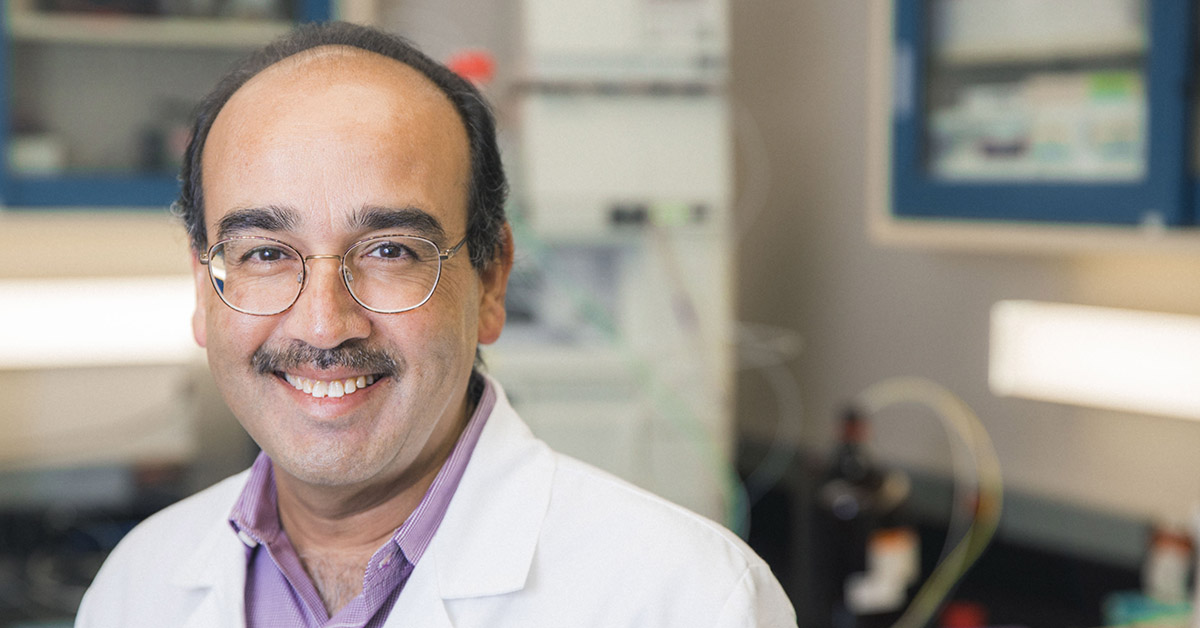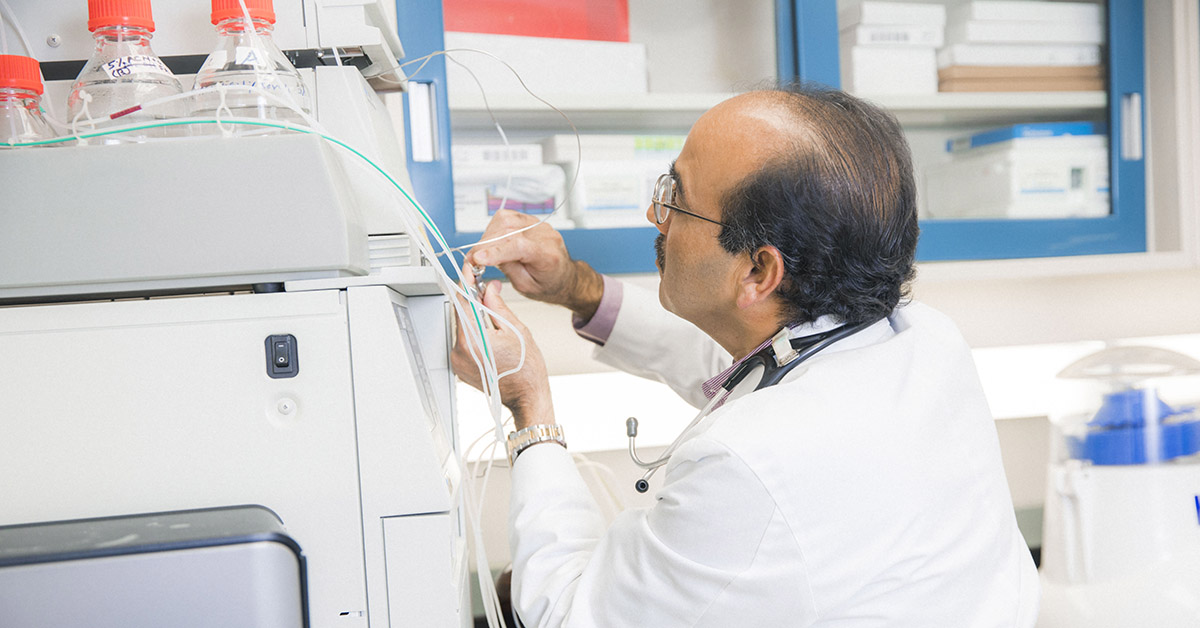Researcher Blocks Protein that Defeats Powerful Tumor Suppressor in Breast Cancer

Sanjay Awasthi, M.D., targets breast cancer prevention with new insights to the p53 gene.
Over half of all breast cancers carry genetic defects in the p53 gene, a powerful
tumor suppressor. Loss of this gene increases the risk of getting breast cancer and
the resultant cancers become highly resistant to treatment.
Researchers at the Texas Tech University Health Sciences Center (TTUHSC) School of
Medicine have blocked the protein to defeat the effects of p53 loss more effectively
than any existing cancer medicine.
Sanjay Awasthi, M.D., a professor in the TTUHSC Department of Internal Medicine and
an oncologist, received a Department of Defense $1,147,500 grant for his research,
“Prevention of Breast Cancer by Haploinsufficiency of RALBP1.”
“Despite decades of research, there had been no satisfactory way to overcome the deleterious
effects of p53 loss – until now,” Awasthi said. “We showed for the first time that
blocking the stress-responsive protein called Rlip (Rlip76 or RALBP1) defeats the
deleterious effects of p53 loss more effectively. This discovery is a game changer
in cancer treatment because more than half of all types of cancers lack normal p53.”
Li-Fraumeni Syndrome (LFS) is a hereditary cancer predisposition syndrome reported
in 1969 by Drs. Frederick Li and Joseph Fraumeni. Approximately 1 out of every 10,000
people have the syndrome and can be afflicted with cancers that are difficult to treat
and often reoccurring. Awasthi said there has been no way of stopping cancer because
those who have the syndrome are missing a gene.

Awasthi will test a chemical derived from oranges, a phosphorothioate antisense directed towards Rlip.
“P53 is called the guardian of the genome because it is essential for regulating cell
division and preventing tumor formation,” Awasthi said “If it is missing the genes
that cause cancer, then they become abnormal and essentially cause cancer in a large
number of people. About 68 percent of all cancers have an abnormality of this gene
and some of those have a complete loss of the gene.”
In order to study this disease, a mouse was created almost 3 decades ago that always
gets cancer and dies at 6 months. Now with this current research, there is a 100 percent
suppression of the cancer.
“I had the opportunity to meet Dr. Fraumini and say, ‘look, I can cure your mice,’”
Awasthi said.
This research began more than 40 years ago with Awasthi’s father, Yogesh C Awasthi,
who worked on an enzyme that defends the body from toxins. Sanjay Awasthi solved the
last step with research experiments in 1982 and a protein cloned in 2003. In 2009,
he had the first successful company called Terapio, which develops therapeutics based
on the Rlip76 protein
Now, this DOD grant will allow TTUHSC researchers to target how to prevent breast
cancer. Awasthi will test a chemical that is derived from oranges, which is where
he found the chemical, a phosphorothioate antisense directed towards Rlip, that activates
this medicine as well as addressing other health issues.
“By giving this protein, I also can help someone with radiation poisoning,” Awasthi
said. The DOD helped us make the medicine. The other significant benefit is that this
medication reverses drug resistance to chemotherapy and other drug resistances.”
Remarkably, drugs that block Rlip also reduce blood sugar, cholesterol and triglycerides. Awasthi’s
findings will lead to highly effective new medications for cancer, diabetes, obesity
and hyperlipidemia.
Related Stories
Celebrating Veterans: TTUHSC’s General Martin Clay’s Legacy of Service and Leadership
From his initial enlistment in the Army National Guard 36 years ago to his leadership in military and civilian health care management roles, Major General Martin Clay’s career has been shaped by adaptability, mission focus and service to others.
Texas Tech University Health Sciences Center School of Nursing Named Best Accelerated Bachelor of Science in Nursing Program in Texas
The TTUHSC School of Nursing Accelerated Bachelor of Science in Nursing (BSN) program has been ranked the No. 1 accelerated nursing program in Texas by RegisteredNursing.org.
TTUHSC Names New Regional Dean for the School of Nursing
Louise Rice, DNP, RN, has been named regional dean of the TTUHSC School of Nursing on the Amarillo campus.
Recent Stories
The John Wayne Cancer Foundation Surgical Oncology Fellowship Program at Texas Tech University Health Sciences Center Announced
TTUHSC is collaborating with the John Wayne Cancer Foundation and has established the Big Cure Endowment, which supports the university’s efforts to reduce cancer incidence and increase survivability of people in rural and underserved areas.
TTUHSC Receives $1 Million Gift from Amarillo National Bank to Expand and Enhance Pediatric Care in the Panhandle
TTUHSC School of Medicine leaders accepted a $1 million philanthropic gift from Amarillo National Bank on Tuesday (Feb. 10), marking a transformational investment in pediatric care for the Texas Panhandle.
Texas Tech University Health Sciences Center Permian Basin Announces Pediatric Residency Program Gift
TTUHSC Permian Basin, along with the Permian Strategic Partnership and the Scharbauer Foundation, Feb. 5 announced a gift that will fund a new pediatric residency.
